- Home
- Howard Pyle
The Merry Adventures of Robin Hood Page 12
The Merry Adventures of Robin Hood Read online
Page 12
First the stranger measured Robin with his eye, and then he measured the oaken staff. “Thou art right, good fellow,” said he presently; “truly, my sword is no match for that cudgel of thine. Bide thee a while till I get me a staff.” So saying, he threw aside the rose that he had been holding all this time, thrust his sword back into the scabbard, and, with a more hasty step than he had yet used, stepped to the roadside where grew the little clump of ground oaks Robin had spoken of. Choosing among them, he presently found a sapling to his liking. He did not cut it, but, rolling up his sleeves a little way, he laid hold of it, placed his heel against the ground, and, with one mighty pull, plucked the young tree up by the roots from out the very earth. Then he came back, trimming away the roots and tender stems with his sword as quietly as if he had done naught to speak of.
The stranger in scarlet taketh a cudgel from the roadside to fight Robin Hood withal.
Little John and the Tanner had been watching all that passed, but when they saw the stranger drag the sapling up from the earth, and heard the rending and snapping of its roots, the Tanner pursed his lips together, drawing his breath between them in a long inward whistle.
“By the breath of my body!” said Little John, as soon as he could gather his wits from their wonder, “sawest thou that, Arthur? Marry, I think our poor master will stand but an ill chance with yon fellow. By Our Lady, he plucked up yon green tree as it were a barley straw.”
Whatever Robin Hood thought, he stood his ground, and now he and the stranger in scarlet stood face to face.
Well did Robin Hood hold his own that day as a midcountry yeoman. This way and that they fought, and back and forth, Robin’s skill against the stranger’s strength. The dust of the highway rose up around them like a cloud, so that at times Little John and the Tanner could see nothing, but only hear the rattle of the staves against one another. Thrice Robin Hood struck the stranger; once upon the arm and twice upon the ribs, and yet had he warded all the other’s blows, only one of which, had it met its mark, would have laid stout Robin lower in the dust than he had ever gone before. At last the stranger struck Robin’s cudgel so fairly in the middle that he could hardly hold his staff in his hand; again he struck, and Robin bent beneath the blow; a third time he struck, and now not only fairly beat down Robin’s guard, but gave him such a rap, also, that down he tumbled into the dusty road.
Robin Hood and the stranger in scarlet fight in the high-road.
The stranger overcometh Robin Hood by dint of great strength, and Robin Hood begs for mercy.
“Hold!” cried Robin Hood, when he saw the stranger raising his staff once more. “I yield me!”
“Hold!” cried Little John, bursting from his cover, with the Tanner at his heels. “Hold! give over, I say!”
Little John bids the stranger hold his hand.
“Nay,” answered the stranger quietly, “if there be two more of you, and each as stout as this good fellow, I am like to have my hands full. Nevertheless, come on, and I will strive my best to serve you all.”
“Stop!” cried Robin Hood, “we will fight no more. I take my vow, this is an ill day for thee and me, Little John. I do verily believe that my wirst, and eke my arm, are palsied by the jar of the blow that this stranger struck me.”
Then Little John turned to Robin Hood. “Why, how now, good master,” said he, “Alas! thou art in an ill plight. Marry, thy jerkin is all befouled with the dust of the road. Let me help thee to arise.”
Little John mocketh at Robin Hood’s mishap.
“A plague on thy aid!” cried Robin, angrily. “I can get to my feet without thy help, good fellow.”
“Nay, but let me at least dust thy coat for thee. I fear thy poor bones are mightily sore,” quoth Little John, soberly, but with a sly twinkle in his eyes.
“Give over, I say!” quoth Robin in a fume. “My coat hath been dusted enough already, without aid of thine.” Then, turning to the stranger, he said, “What may be thy name, good fellow?”
“My name is Gamwell,” answered the other.
“Ha!” cried Robin, “is it even so? I have near kin of that name. Whence camest thou, fair friend?”
“From Maxfield Town I come,” answered the stranger. “There was I born and bred, and thence I come to seek my mother’s young brother, whom men call Robin Hood. So, if perchance thou mayst direct me”—
“Ha! Will Gamwell!” cried Robin, placing both hands upon the other’s shoulders and holding him off at arm’s length. “Surely, it can be none other! I might have known thee by that pretty maiden air of thine,—that dainty, finicking manner of gait. Dost thou not know me, lad? Look upon me well.”
Robin Hood findeth that the stranger is his own sister’s son.
“Now, by the breath of my body!” cried the other, “I do believe from my heart that thou art mine own Uncle Robin. Nay, certain it is so!” and each flung his arms around the other, kissing him upon the cheek. Then once more Robin held his kinsman off at arm’s length and scanned him keenly from top to toe. “Why, how now,” quoth he, “what change is here? Verily, some eight or ten years ago I left thee a stripling lad, with great joints and ill-hung limbs, and lo! here thou art, as tight a fellow as e’er I set mine eyes upon. Dost thou not remember, lad, how I showed thee the proper way to nip the goose feather betwixt thy fingers and throw out thy bow arm steadily? Thou gavest great promise of being a keen archer. And dost thou not mind how I taught thee to fend and parry with the cudgel?
“Yea,” said young Gamwell, “and I did so look up to thee, and thought thee so above all other men that, I make my vow, had I known who thou wert, I would never have dared to lift hand against thee this day. I trust I did thee no great harm.”
“No, no,” quoth Robin, hastily, and looking sideways at Little John, “thou didst not harm me. But say no more of that, I prythee. Yet I will say, lad, that I hope I may never feel again such a blow as thou didst give me. By ’r Lady, my arm doth tingle yet from finger-nail to elbow. Truly, I thought that I was palsied for life. I tell thee, coz, that thou art the strongest man that ever I laid mine eyes upon. I take my vow, I felt my stomach quake when I beheld thee pluck up yon green tree as thou didst. But tell me, how camest thou to leave Sir Edward and thy mother?”
“Alas!” answered young Gamwell, “it is an ill story, uncle, that I have to tell thee. My father’s Will Gramwell steward, who came to us after old Giles telleth his story. Crookleg died, was ever a saucy varlet, and I know not why my father kept him, saving that he did oversee with great judgment. It used to gall me to hear him speak up so boldly to my father, who, thou knowest, was ever a patient man to those about him, and slow to anger and harsh words. Well, one day—and an ill day it was for that saucy fellow—he sought to berate my father, I standing by. I could stand it no longer, good uncle, so, stepping forth, I gave him a box o’ the ear, and—wouldst thou believe it?—the fellow straightway died o’t. I think they said I broke his neck, or something o’ the like. So off they packed me to seek thee and escape the law. I was on my way when thou sawest me, and here I am.”
“Well, by the faith of my heart,” quoth Robin Hood, “for any one escaping the law, thou wast taking it the most easily that ever I beheld in all my life. Whenever did any one in all the world see one who had slain a man, and was escaping because of it, tripping along the highway like a dainty court damsel, sniffing at a rose the while?”
“Nay, uncle,” answered Will Gamwell, “over haste never churned good butter, as the old saying hath it. Moreover, I do verily believe that this overstrength of my body hath taken the nimbleness out of my heels. Why, thou didst but just now rap me thrice, and I thee never a once, save by overbearing thee by my strength.”
“Nay,” quoth Robin, “let us say no more on that score. I am right glad to see thee, Will, and thou wilt add great honor and credit to my band of merry fellows. But thou must change thy name, for warrants will be out presently against thee; so, because of thy gay clothes, thou shalt henceforth and for aye be
called Will Scarlet.”
Will Gamwell hath a new name given to him.
“Will Scarlet,” quoth Little John, stepping forward and reaching out his great palm, which the other took, “Will Scarlet, the name fitteth thee well. Right glad am I to welcome thee amongst us. I am called Little John; and this is a new member who has just joined us, a stout tanner named Arthur a Bland. Thou art like to achieve fame, Will, let me tell thee, for there will be many a merry ballad sung about the country, and many a merry story told in Sherwood of how Robin Hood taught Little John and Arthur a Bland the proper way to use the quarterstaff; likewise, as it were, how our good master bit off so large a piece of cake that he choked on it.”
Little John galleth Robin Hood still further.
“Nay, good Little John,” quoth Robin, gently, for he liked ill to have such a jest told of him, “Why should we speak of this little matter? Prythee, let us keep this day’s doings amongst ourselves.”
“With all my heart,” quoth Little John. “But, good master, I thought that thou didst love a merry story, because thou hast so often made a jest about a certain increase of fatness on my joints, of flesh gathered by my abiding with the Sheriff of—”
“Nay, good Little John,” said Robin, hastily, “I do bethink me I have said full enough on that score.”
“It is well,” quoth Little John, “for in truth I myself have tired of it somewhat. But now I bethink me, thou didst also seem minded to make a jest of the rain that threatened last night; so—”
“Nay, then,” said Robin Hood, testily, “I was mistaken. I remember me now it did seem to threaten rain.”
“Truly, I did think so myself,” quoth Little John; “therefore, no doubt, thou dost think it was wise of me to abide all night at the Blue Boar Inn, instead of venturing forth in such stormy weather; dost thou not?”
“A plague of thee and thy doings!” cried Robin Hood. “If thou wilt have it so, thou wert right to abide wherever thou didst choose.”
“Once more, it is well,” quoth Little John. “As for myself, I have been blind this day. I did not see thee drubbed; I did not see thee tumbled heels over head in the dust; and if any man says that thou wert, I can with a clear conscience rattle his lying tongue betwixt his teeth.”
“Come,” cried Robin, biting his nether lip, while the others could not forbear laughing, “We will go no farther to-day, but will return to Sherwood, and thou shalt go to Ancaster another time, Little John.”
So said Robin, for now that his bones were sore, he felt as though a long journey would be an ill thing for him. So, turning their backs, they retraced their steps whence they came.
The four yeomen turn their faces towards Sherwood Forest again.
III.
The Merry Adventure with Midge the Miller.
WHEN the four yeomen had travelled for a long time toward Sherwood again, high noontide being past, they began to wax hungry. Quoth Robin Hood, “I would that I had somewhat to eat. Methinks a good loaf of white bread, with a piece of snow-white cheese, washed down with a draught of humming ale, were a feast for a king.”
Robin Hood waxeth hungry.
“Since thou speakest of it,” said Will Scarlet, “methinks it would not be amiss myself. There is that within me crieth out, ‘Victuals, good friend, victuals!”
“I know a house near by,” said Arthur a Bland, “and, had I but the money, I would bring ye that ye speak of; to wit, a sweet loaf of bread, a fair cheese, and a skin of brown ale.”
“For the matter of that, thou knowest I have money by me, good master,” quoth Little John.
“Why, so thou hast, Little John,” said Robin. “How much money will it take, good Arthur, to buy us meat and drink?”
“I think that six broad pennies will buy food enow for a dozen men,” said the Tanner.
“Then give him six pennies, Little John,” quoth Robin, “for methinks food for three men will about fit my need. Now get thee gone, Arthur, with the money, and bring the food here, for there is a sweet shade in that thicket yonder, beside the road, and there will we eat our meal.”
So Little John gave Arthur the money, and the others stepped to the thicket, there to await the return of the Tanner.
The stout tanner goeth to buy them some food.
After a time he came back, bearing with him a great brown loaf of bread and a fair, round cheese, and a goat-skin full of stout March beer, slung over his shoulders. Then Will Scarlet took his sword and divided the loaf and the cheese into four fair portions, and each man helped himself. Then Robin Hood took a deep pull at the beer. “Aha!” said he, drawing in his breath, “never have I tasted sweeter drink than this.”
After this no man spake more, but each munched away at his bread and cheese lustily, with ever and anon a pull at the beer.
At last Will Scarlet looked at a small piece of bread he still held in his hand, and quoth he, “Methinks I will give this to the sparrows.” So, throwing it from him, he brushed the crumbs from his jerkin.
“I, too,” quoth Robin, “have had enough, I think.” As for Little John and the Tanner, they had by this time eaten every crumb of their bread and cheese.
“Now, sweet friends,” quoth Robin, gathering up the skin of beer, that was not yet nearly empty, “I do wish that ye may ever have such happiness as a good stout meal like this bringeth to my heart. Thus pledging you all, I drink to your health, that it may ever remain such as it is this day.” So saying, he took a long, hearty pull at the stout beer. Next Will Scarlet took the skin, then Little John, and, last of all, the stout Tanner. A good full skin of beer, as fat as a town tradesman, began the round; a poor, flabby hide came forth, as weak and limp as an aged man.
“Now,” quoth Robin, “I do feel myself another man, and would fain enjoy something pleasant before going farther upon our journey. I do bethink me, Wilt, that thou didst use to have a pretty voice, and one that tuned sweetly upon a song. Prythee, give us one ere we journey farther.”
“Truly, I do not mind turning a tune,” answered Will Scarlet; “but I would not sing alone.”
“Nay, others will follow. Strike up, lad,” quoth Robin.
“In that case, ’tis well,” said Will Scarlet. “I do call to mind a song that a certain minstrel used to sing in my father’s hall, upon occasion.
Will Scarlet singeth a song.
I know no name for it, and so can give you none; but thus it is.“Then, clearing his throat, he sang as follows:—
“In the merry blossom time,
When love-longings flood the breast,
When the flower is on the lime,
When the small fowl builds her nest,
Sweetly sings the nightingale
And the throstle-cock so bold;
Cuckoo in the dewy dale,
And the turtle in the wild.
But the robin I love dear,
For he singeth through the year.
Robin! Robin!
Merry Robin!
So I’d have my true love be:
Not to fly
At the nigh
Sign of cold adversity.
“When the Spring brings sweet delights,
When aloft the lark doth rise,
Lovers woo o’ mellow nights,
And youths peep in maidens’ eyes,
That time blooms the eglantine,
Daisies pied upon the hill,
Cowslips fair and columbine,
Dusky violets by the rill.
But the Ivy green doth grow
When the north wind bringeth snow.
Ivy! Ivy!
Stanch and true!
Thus I’d have her love to be;
Not to die
At the nigh
Breath of cold adversity.”
“’Tis well sung,” quoth Robin; “but, cousin, I tell thee plain, I would rather hear a stout fellow like thee sing some lusty ballad than a finicking song of flowers and birds, and what not. Yet, thou didst sing it fair, and ’tis none so bad a snatch
of a song, for the matter of that. Now, Tanner, it is thy turn next.”
“I know not,” quoth Arthur, smiling, with his head on one side, like a budding lass that is asked to dance, “I know not that I can match our sweet friend’s song; moreover, I do verily think that I have caught a cold and have a certain tickling and huskiness in the windpipe.”
“Nay, sing up, friend,” quoth Little John, who sat next to him, patting him upon the shoulder. “Thou hast a fair, round, mellow voice; let us have a touch of it.”
“Nay, an ye will ha’ a poor thing,” said Arthur, “I will do my best. Have ye ever heard of the wooing of Sir Keith, the stout young Cornish knight, in good King Arthur’s time?”
“Methinks I have heard somewhat of it,” said Robin; “but ne’ertheless strike up thy ditty and let us hear it, for, as I do remember me, it is a gallant song; so out with it, good fellow.”
Arthur a Bland singeth of the Wooing of Sir Keith.
Thereupon, clearing his throat, the Tanner, without more ado, began to sing the ballad of
THE WOOING OF SIR KEITH.
“King Arthur sat in his royal hall,
And about on either hand
Was many a noble lordling tall,
The greatest in the land.
“Sat Lancelot with raven locks,
Gawaine with golden hair,
Sir Tristram, Kay who kept the locks,
And many another there.
“And through the stainèd windows bright,

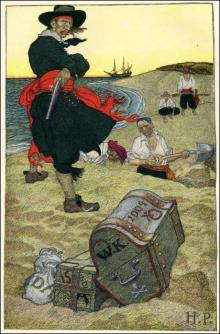 Howard Pyle's Book of Pirates
Howard Pyle's Book of Pirates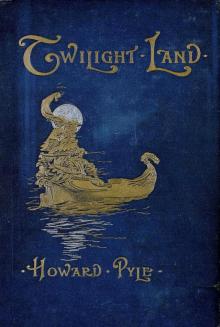 Twilight Land
Twilight Land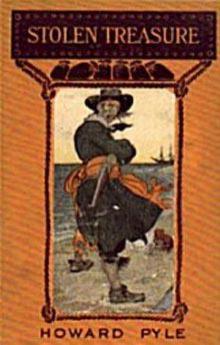 Stolen Treasure
Stolen Treasure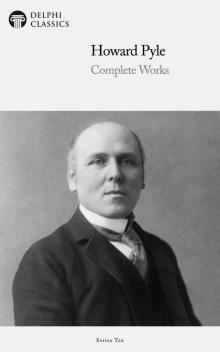 Complete Works of Howard Pyle
Complete Works of Howard Pyle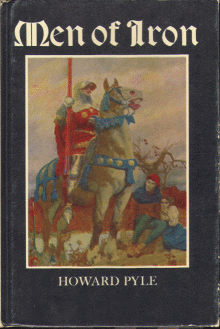 Men of Iron
Men of Iron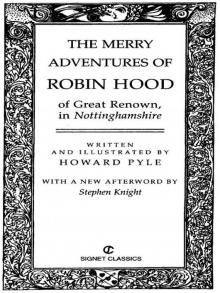 The Merry Adventures of Robin Hood
The Merry Adventures of Robin Hood The Wonder Clock
The Wonder Clock